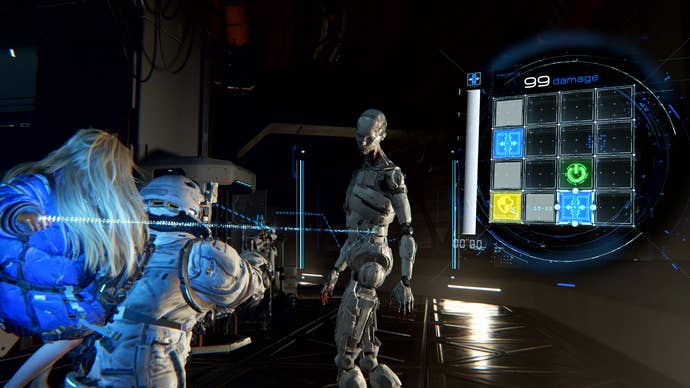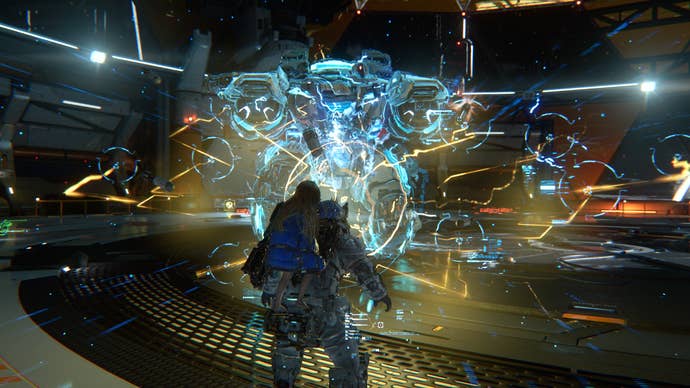I loaded up a recent Pragmata demo in blissful ignorance – or, at the very least, regular ignorance – of the depth of feeling surrounding its central hacking system. The need to shut down robotic baddies’ defences before giving them the ol’ semi-auto handshake is, it seems, widely enough perceived as a potential dealbreaker that Capcom have recreated it as a browser game. As if to whisper a reassuring “No, look, it’s not that fiddly,” into sceptical ears ahead of release next year.
I get it. Described in the abstract, it does sound like you can have a little third-person shooting, as a treat, but only after you finish your tile-colouring minigame. After actually playing Pragmata, though, I’m firmly on Team Hacking: besides being rich with upgrade potential, it doesn’t interrupt the action so much as conduct it, specifically to a tempo that feels refreshingly unique by over-the-shoulder standards.
To recap, your unfortunate spaceman Hugh is on piggyback duty for Diana, the cheery android girl who offers escape from an AI-ravaged moonbase. Whereas Hugh’s dumb flesh is only good for pulling triggers and the occasional dash, Diana can hack doors and bots on command, turning the latter from implacable death machines into scrappable metal. The hacking process involves moving a cursor through various grid cells towards a shutdown icon, with bonus effects depending on the cells you hit along the way.

Again, not that exciting in word form. But I’m liking how much this (entirely real-time) procedure impacts the usual business of pointing and shooting. First, there’s a hit of tension, as your invulnerable foe starts priming missiles or stomping towards you; a surprisingly repeatable “Come on, come ON” moment as you rush to rewire their innards before they can reach stabbing range. Then, relief: their shield drops and you blast them into exploding shards, often in just one or two shots. Even basic enemies can produce this sense of taut buildup and big, booming climax, and while boss fights are more of a back-and-forth, finding the openings to successfully hack a megabot (whose grids are bigger and trickier to navigate) still makes for a far more interesting interaction than merely trading gunfire from the off.
Hacking upgrades intrigue as well. My clash with one of the base’s chunkier guardians was aided by the recent discovery of an anti-armour mod that added a new cell type to the robot’s grid – if I passed through this on the way to his off switch, the resulting hack would amplify damage during the vulnerable period. This highlights an easily understated quality of the whole idea: it’s not just a minigame that needs beating with a predetermined, ‘correct’ input, but a means of being flexible about how you fight. I could, for instance, have ignored the debuff nodes entirely, for a less individually effective but much faster hack that I could more reliably repeat between the boss’ attack patterns. In choosing to risk it, though, my slower, less frequent hacks let me dole out more damage with less ammo. Will the thorough approach work best for every situation? Likely not, but it’s nice to have options.

There’s also potential for (what I hope will be) more exotic upgrades than simple damage modifiers. I know nothing of what Capcom actually has planned for these, but there’s scope here to inflict all manner of robo-afflictions, provided you’re willing to risk more time on the grid. Maybe even granting a toybox of Dishonored-style powers to confuse and displace the bots before you decommission them.
I appreciate that’s me falling into the classic preview trap of dissecting the game I’d like to see, not the one I did. And, in truth, much of what I did see was grey sci-fi generica. Fight backdrops are often just boxy corridors, and the bots themselves don’t have much to their design, outside of the protective flaps that raise up in electric panic when Diana breaches their firewalls.
There is a spark of something more here, though, and the hacking – for all its knock-on effects to pacing, suspense, and micro-tactical decision making – is at the heart of it. I wouldn’t have thought a shooter could be made more exciting by minimising the amount of shooting involved. But then, I wouldn’t have thought I’d be keen for a Murder Dad game in 2025 either.
Check out our Gamescom 2025 event hub for all the PC game announcements and preview coverage from Cologne.







